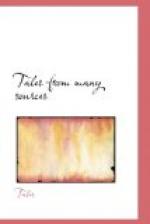But when John Broom was so near the ground as to be safe, the farm-bailiff turned wrathfully upon his son, who had been gazing open-mouthed at the sight which had so interested his father.
“Ye look weel standing gawping here, before the leddies,” said he, “wasting the precious hours, and bringing your father’s grey hairs wi’ sorrow to the grave; and John Broom yonder shaming ye, and you not so much as thinking to fetch the perch for him, ye lazy loon. Away wi’ ye and get it, before I lay a stick about your shoulders.”
And when his son had gone for the perch, and John Broom was safely on the ground, laughing, bleeding, and triumphant, the farm-bailiff said,—
“Ye’re a bauld chiel, John Broom, I’ll say that for ye.”
INTO THE MIST.
Unfortunately the favourable impression produced by “the gipsy lad’s” daring soon passed from the farm-bailiff’s mind. It was partly effaced by the old jealousy of the little ladies favour. Miss Betty gave the boy no less than four silver shillings, and he ungraciously refused to let the farm-bailiff place them in a savings bank for him.
Matters got from bad to worse. The farming man was not the only one who was jealous, and John Broom himself was as idle and restless as ever. Though, if he had listened respectfully to the Scotchman’s counsel, or shown any disposition to look up to and be guided by him, much might have been overlooked. But he made fun of him and made a friend of the cowherd. And this latter most manifest token of low breeding vexed the respectable taste of the farm-bailiff.
John Broom had his own grievances too, and he brooded over them. He thought the little ladies had given him over to the farm-bailiff, because they had ceased to care for him, and that the farm-bailiff was prejudiced against him beyond any hope of propitiation. The village folk taunted him, too, with being an outcast, and called him Gipsy John, and this maddened him. Then he would creep into the cowhouse and lie in the straw against the white cow’s warm back, and for a few of Miss Betty’s coppers, to spend in beer or tobacco, the cowherd would hide him from the farm-bailiff and tell him countryside tales. To Thomasina’s stories of ghosts and gossip, he would add strange tales of smugglers on the near-lying coast, and as John Broom listened, his restless blood rebelled more and more against the sour sneers and dry drudgery that he got from the farm-bailiff.
Nor were sneers the sharpest punishment his misdemeanours earned. The farm-bailiff’s stick was thick and his arm was strong, and he had a tendency to believe that if a flogging was good for a boy, the more he had of it the better it would be for him.
And John Broom, who never let a cry escape him at the time, would steal away afterwards and sob out his grief into the long soft coat of the sympathising sheep dog.




